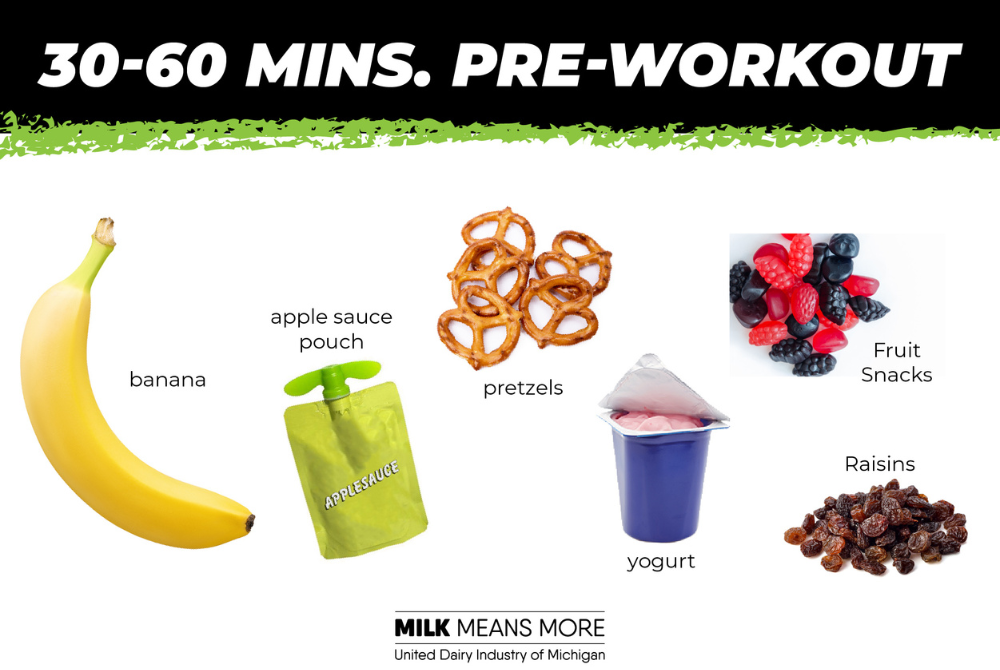
Coach's Guide to Nutrition: Pre-Workout Snacks
September 10, 2024
Heading into practice or a game under-fueled may take away from athlete performance. Encourage student-athletes to not only eat regularly throughout the day, but to have a small, carbohydrate-focused snack about 30-60 minutes before activity. This will top off their energy stores so they are ready to hit the field.
Pre-workout snacks don’t have to be complicated. Choose easy, high-carb snacks that can be stored safely in a gym bag.
Snacking can be detrimental when done out of boredom or in place of regular, balanced meals. But, for an athlete, healthy snacks can aid performance and recovery.
In planning to eat every 3-4 hours, a mid-morning snack may be ideal. Having a snack in the hour or two before practice and in the ‘window of opportunity’ following practice can help maintain energy levels and ensure proper recovery.
Work with your athletes to create simple snacks that are easy to transport. Encourage athletes to include a carb and protein in each snack when possible. Fresh fruit, granola bars with 8-10 grams of protein, or trail mix that includes nuts/seeds and dried fruit are easy to keep in a gym bag and relatively affordable. A small cooler with an ice pack is a great way to keep snacks cold and fresh.
Snacks are important to maintain energy between meals, before exercise and after workouts. Snacks before and after exercise help performance as well as aid optimal recovery. Try to include carbs and protein in every snack.
Information above is excerpted from UDIM’s A Coach’s Guide to Nutrition.

Is Your Teen Sleep-Deprived?
March 2, 2021
Many teens tend to stay up late. They’re on social media, watching television or YouTube, studying, or just tossing and turning for hours unable to fall asleep. Sleep can also be disrupted during stressful times during adolescence like exams or relationship problems.
More than two-thirds of high school students in the U.S. are failing to get sufficient sleep on school nights, according to a recent study from the Centers for Disease Control and Prevention (CDC).
“The American Academy of Sleep Medicine (AASM) recommends that teens should sleep eight to 10 hours per night on a regular basis to promote optimal health,” explains Virginia Skiba, M.D., a sleep specialist with the Henry Ford Health System. Insufficient sleep can have a negative impact on their grades, athletic performance and mental and physical well-being, including depression and anxiety issues and drug and alcohol use.
It’s a safety issue, as well. Motor vehicle crashes are a leading cause of teen deaths in the U.S. In a recent survey, more than half of teens admitted to having driven when feeling too tired and nearly one in 10 teens reported having fallen asleep at the wheel.
A typical high school student is biologically wired to fall asleep around 11 p.m. Many high schools in Michigan start school as early as 7 a.m. – long before a teen’s natural wake time. The AASM advocates a later middle school and high school start time of 8:30 a.m. or later.
Tips for a Good Night’s Sleep
Teenagers’ sleep-wake cycles are biologically determined – they are programmed to stay up late at night and sleep later in the morning. Most teens are instinctively night owls. Falling asleep is often a challenge, but there are things teens can do that may help them get a good night’s sleep.
Here are some tips from Dr. Skiba, which apply not only to teens but are great advice for anyone who is struggling with feeling sleep deprived:
► First and foremost, make sleep a priority. In our busy society, too often making time for sleep is last on the list.
► Maintain a consistent bedtime and wake time that allows at least eight hours of nightly sleep, including on weekends and vacation.
► Keep the bedroom quiet and dark. Keep the TV, computer, phone and video game system out of the bedroom.
► Set a technology curfew; turn off all devices one hour before bedtime.
► Engage in quiet activities before bed, like reading, journaling or yoga, and establish a relaxing bedtime ritual.
Dr. Virginia Skiba is a sleep medicine expert who sees patients at Henry Ford Medical Centers in Grosse Pointe and Sterling Heights.
If your teen is struggling with sleep issues, talk to your pediatrician or family doctor to find out if he or she could benefit from a sleep evaluation. Call 1-800-HENRYFORD (436-7936) or visit henryford.com to learn more.
Visit henryford.com/sports or call (313) 972-4216.



